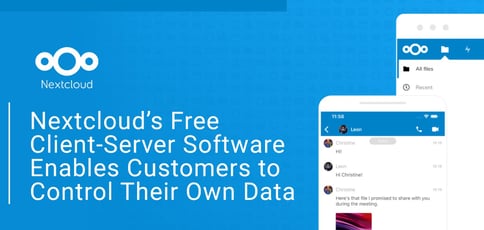
TL; DR: Nextcloud is a free and open-source content collaboration platform that users can install and operate on their private servers. The solution, often leveraged as an alternative to Dropbox or Google Drive, centers on control, privacy, and security. With the recent release of Nextcloud Hub 22, the organization introduced enhanced knowledge-sharing capabilities for remote workforces, including asynchronous collaboration.
I’m excited to spread the word about Nextcloud GmBH because my family has used the company’s open-source client-server software for years. We’re coming up on a decade since we started hosting our own instance of ownCloud — the project from which the open-source software Nextcloud was forked.
We switched over to Nextcloud after ownCloud Founder Frank Karlitschek introduced it in 2016. Frank rebooted his ownCloud project to create a next-generation file synchronization and sharing solution.
A critical difference between the two: Nextcloud GmbH doesn’t pursue monetization via an open-core business model, dual-licensing sales, or external investors.
With the launch of Nextcloud, Frank and his team set a new standard in self-hosted collaboration, providing security and control in an open, transparent, and reliable manner. The solution is also super user-friendly.

“We started this company with idealistic motivations — we wanted to help people take back control of their data and privacy,” said Jos Poortvliet, Head of Marketing at Nextcloud GmbH. “We put in a lot of effort to make sure that our software is really easy to install and use, even if you’re running it at home on a Raspberry Pi.”
SMBs, enterprises, governmental organizations, and home users all benefit from Nextcloud’s flexible collaboration solutions. Users have installed the company’s software on more than 400,000 servers, with some clusters supporting tens of millions of users.
Nextcloud’s technology combines the ease of use and convenience of consumer-grade solutions like Google Drive and Dropbox with the security, privacy, and controls that businesses require. The result is a free client-server solution that enables users of all kinds to take control of their data.
A Software Suite That’s Free, Open, and Self-Hosted
Nextcloud is a self-hosted solution, meaning that users are free to install the software on their own server or find a provider to do so.
“You can choose to do it yourself, but there are also dozens of companies that provide anything from a barebones webspace to extremely high-quality solutions aimed for large businesses,” Jos said. “There’s a super-wide range of what you will find.”
My husband’s an IT nerd, and our data isn’t mission-critical, so we host our Nextcloud instance on a backed-up HP Microserver. But the most reliable and convenient option for private users or small businesses is typically available through a trusted provider. Many sites (including ours!) offer recommendations on the best hosts for specific purposes. Users can also opt for a host listed through Nextcloud’s Simple Signup program.
The quality providers listed on the Nextcloud site all offer free accounts on shared servers with 2GB to 5GB of storage. Most provide additional storage and a broader catalog of paid options for a fee, which funds the free accounts. However, users should be aware that Nextcloud has no official affiliation with the program’s suppliers and bears no responsibility for their conduct.
Larger teams and organizations can find a range of complementary options to deploy, optimize, and maintain the open-source product through Nextcloud’s certified partners list.
Multiple Collaboration Features
Nextcloud is much more than a file synchronization and sharing suite. The free and open-source software includes solutions for calls, chats, and web meetings, as well as calendar, contact, and webmail software.
“We’re the frontend that connects everything together in terms of end-user collaboration,” Jos said. “We often see companies that use all these different solutions — Slack, Dropbox, Google Drive. But they end up in a situation where they don’t know where the latest version of a particular document is. Was it the one shared in Slack, uploaded to DropBox, or sent via email?”
Nextcloud eliminates that disconnect. Users collaborate in real time with immediate access to all data from any device, anywhere. The software provides an intuitive user experience across mobile, web, and desktop with deeply integrated document features.
Nextcloud also alerts users to shares and comments in real time and offers built-in, collaborative editing tools for Microsoft Office-compatible files. The solution also includes a comprehensive range of productivity tools for managing mail, appointments, and projects.
Merging Usability with Reliability, Control, and Compliance
Jos told us that Nextcloud’s biggest competitor is Microsoft Office 365, which is also an all-in-one collaboration solution. By choosing Nextcloud’s on-premises option, users can guarantee that data never leaves the organization, remaining 100% confidential.
“We offer an efficient single-source solution and that is, of course, completely under your control, whereas with Microsoft you’re giving that control to a company,” Jos said. “To some degree, it’s about data and compliance. Other users just want to protect themselves.”
Nextcloud’s open-source nature guarantees complete vendor independence and eliminates the risk of compliance issues. Because of this, Nextcloud’s user base is far-ranging, including universities and research organizations, financial services and manufacturing firms, and airlines.

Governments, which are shifting away from foreign cloud providers for digital sovereignty purposes, also use the open-source software. In fact, Nextcloud has become one of the most widely used self-hosted private cloud solutions by government entities, including the German Federal Government.
Of course, individuals and small businesses also turn to Nextcloud to streamline workflows, improve collaboration, and boost operational agility.
“We really pride ourselves on providing the ease of use and productivity benefits of a consumer-level platform with the reliability, control, and the compliance considerations of an enterprise-grade platform,” Jos said.
Nextcloud saw a spike in product adoption as the pandemic changed the paradigm of work. Nextcloud GmbH itself is a 100% remote company, with employees located across the globe, from Canada to Hawaii to India.
“The crisis has sped up adoption, but not everyone has seen the light,” Jos said. “That gives us more room for growth.”
Nextcloud Hub 22: Introducing Enhanced Knowledge Management
Over the years, Nextcloud has evolved to include a nice feature set — from file sharing and management to video conferencing and organizational tools. With its latest release, Nextcloud Hub 22, the company brings enhanced knowledge management for remote work into the picture.
The Nextcloud team designed the product to suit today’s digital workplace. Features include user-defined groups, integrated chat and task management, and a simple approval procedure. The edition also offers integrated PDF signing with DocuSign, EIDEasy, and LibreSign.
“The last year has demanded an acceleration of digitalization in organizations,” said Frank Karlitschek, CEO at Nextcloud GmbH, in a press release. “Nextcloud has aligned its roadmap to the reality of new work in modern organizations, delivering the capabilities needed for the paperless office. With optimized workflows and more effective self-management for teams, Nextcloud Hub 22 will further facilitate remote work and global collaboration for teams.”
Jos said to expect more improvements from a digital office perspective in future releases.
“We have the scalability for massive deployments,” he said. “We have the usability pretty much down. Now we need to optimize workflows to bring intelligence into the solution.”
HostingAdvice.com is a free online resource that offers valuable content and comparison services to users. To keep this resource 100% free, we receive compensation from many of the offers listed on the site. Along with key review factors, this compensation may impact how and where products appear across the site (including, for example, the order in which they appear). HostingAdvice.com does not include the entire universe of available offers. Editorial opinions expressed on the site are strictly our own and are not provided, endorsed, or approved by advertisers.
Our site is committed to publishing independent, accurate content guided by strict editorial guidelines. Before articles and reviews are published on our site, they undergo a thorough review process performed by a team of independent editors and subject-matter experts to ensure the content’s accuracy, timeliness, and impartiality. Our editorial team is separate and independent of our site’s advertisers, and the opinions they express on our site are their own. To read more about our team members and their editorial backgrounds, please visit our site’s About page.

